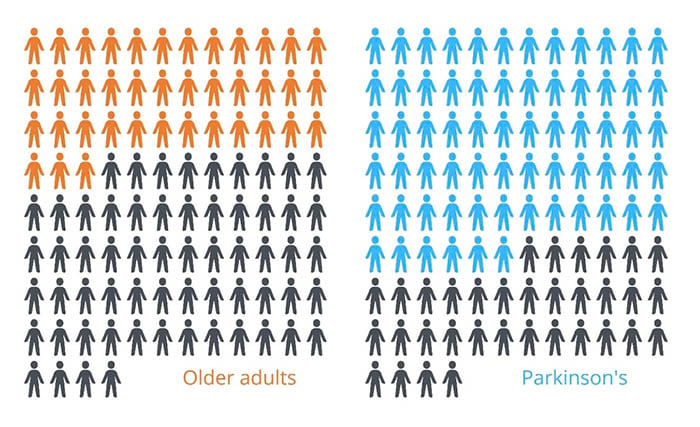Finding the link between Parkinson's and delirium
3 April 2024 | By: Newcastle University | 3 min read
Older people with Parkinson’s are at increased risk of delirium and worse outcomes compared to those without, according to a new study from Newcastle University.
Researchers from our Faculty of Medical Sciences have been working to identify the correlation between Parkinson's disease and delirium. Read on to find out the results of their work.
Contents:
-
What is Parkinson's disease?
-
Delirium in Parkinson’s is common
-
Risks of delirium
-
Preventing and managing delirium
What is Parkinson's disease?
Parkinson’s disease is a progressive neurological condition. People with Parkinson’s don’t have enough of the chemical dopamine in their brains because some of the nerve cells that make it have stopped working. Parkinson’s is the fastest-growing neurological condition in the world and currently, there is no cure.
Delirium is a serious disturbance in brain function that can happen when someone is unwell. Delirium is distressing, both for the person with delirium and for their family and friends. People with delirium can appear confused, have difficulty following conversations, or be very sleepy during the day. They can hallucinate (see or hear things that are not there), have false beliefs (such as thinking they are in a strange place or that people are trying to harm them), or feel agitated. In some cases, delirium may also cause permanent damage to the brain.
These features can also occur in people with Parkinson’s, making delirium more difficult to identify. Therefore, it is vital that we develop ways of identifying delirium in Parkinson’s.
Delirium in Parkinson’s is common
Researchers at Newcastle University have worked together to combine data from two prospective research studies: the DELIRIUM-PD study, led by Parkinson's UK Senior Fellow Dr Rachael Lawson; and the DECIDE study, led by National Institute for Health & Care Research (NIHR) Clinical Lecturer Dr Sarah Richardson. This has allowed researchers to directly compare delirium in people with Parkinson’s against older adults without Parkinson’s, throughout their hospital admission and how they progressed over the 12 months following their hospital admission.
Florence Gerakios from the Brain and Movement group is completing her PhD on the presentation of delirium in Parkinson’s. She has found that delirium occurred in 66% of people with Parkinson’s compared to 38% in older adults without Parkinson’s.
This is of significant clinical importance, as it shows that delirium is more common in Parkinson’s than we previously thought. Delirium is generally under-reported in hospitals, but these findings highlight the importance of screening for, and identifying delirium, in Parkinson’s.
'Delirium occurs in a fifth of hospital admissions, but we found it was more common in Parkinson’s, affecting more than half of people admitted to hospital. There’s a real unmet need with research in this area, in that there isn’t much research currently. It’s worrying because delirium can be very serious when people are unwell, and as we have shown, it can lead to poor outcomes.' Dr Rachael Lawson, Newcastle University.

Graphic illustrating a higher percentage of delirium in older adults with Parkinson's compared to those without.
Risks of delirium
Delirium has been previously shown to increase the risk of mortality, and developing dementia. However, there has been a lack of prospective studies on Parkinson’s until now.
The research team also found that people with Parkinson’s and delirium had a six-times increased risk of mortality in one year, a six-times increased risk of developing dementia, and a ten-times increased risk of being discharged into residential or nursing care. This is compared to older adults, where an increased risk of dementia was only found in those with delirium.
These findings suggest that delirium leads to worse patient outcomes overall in people with Parkinson’s. Delirium may exacerbate a decline in function and Parkinson’s symptoms, leading to increased care needs. Understanding these needs is vital, both to the individual with Parkinson’s and wider society due to the current crisis in social care.
'These results really emphasise the need for an increased awareness of delirium, particularly in people with long-term conditions such as Parkinson’s, as well as further research into how best to diagnose and manage it.' Dr Sarah Richardson, Newcastle University
Preventing and managing delirium
This work from researchers at Newcastle University has highlighted the urgent need to prevent and manage delirium in Parkinson’s, especially as delirium is preventable in up to a third of cases. However, there is a lack of evidence on the management of delirium, specifically in Parkinson’s.
As part of their ongoing work, researchers are looking at data from these two studies across the hospital admissions of people with and without Parkinson’s. This will give us a better understanding of what delirium looks like in Parkinson’s, whether it presents differently compared to people without Parkinson’s, and how the symptoms change over time. This will help us to identify and diagnose delirium more quickly, leading to better outcomes for people living with Parkinson’s.
According to Professor Alison Yarnall, Honorary Consultant in Older People's Medicine, 'delirium is of paramount importance in older adults admitted to hospital, and from this research, we have shown that it is even more common in people with Parkinson’s disease. Due to the negative health outcomes, it is vital that we drive forward research in this area, particularly pertaining to prevention.'

Dr Sarah Richardson, Florence Gerakios, and Dr Rachael Lawson outside of Newcastle University's Clinical Ageing Research Unit (CARU)
You might also like:
- read the full article: Florence Gerakios, Alison J Yarnall, Gemma Bate, Laura Wright, Daniel Davis, Blossom C M Stephan, Louise Robinson, Carol Brayne, Glenn Stebbins, John-Paul Taylor, David J Burn, Louise M Allan, Sarah J Richardson, Rachael A Lawson, Delirium is more common and associated with worse outcomes in Parkinson’s disease compared to older adult controls: results of two prospective longitudinal cohort studies, Age and Ageing, Volume 53, Issue 3, March 2024, afae046, https://doi.org/10.1093/ageing/afae046
- discover more about our researchers by reading their academic profiles:
- Dr Rachael Lawson, Parkinson’s UK Senior Research Fellow
- Dr Sarah Richardson, NIHR Clinical Lecturer
- Florence Gerakios, Clinical Trials Associate
- Prof. Alison Yarnall, Professor of Geriatric Medicine and Honorary Consultant in Older People's Medicine
- explore our AGE Research Group and Brain and Movement Group to learn more about their research
- learn more about our Faculty of Medical Sciences, home to a world-leading collaboration of researchers, doctors and teaching professionals
- explore more of our work in Ageing and Health
